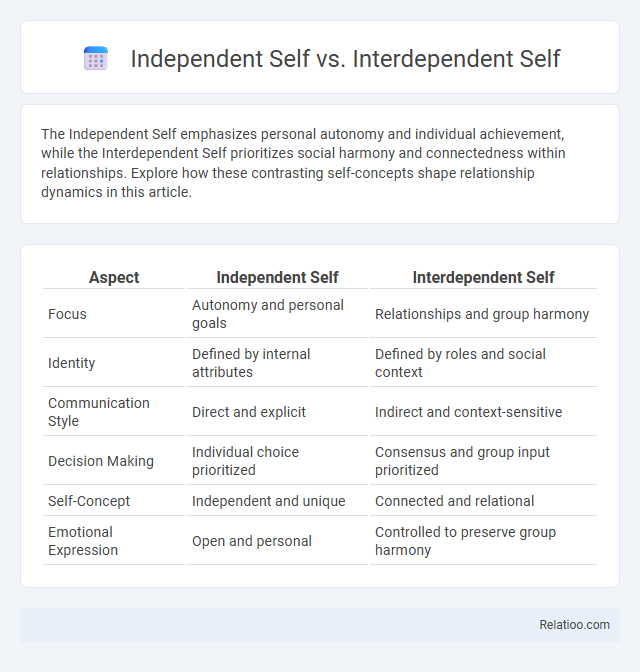The Independent Self emphasizes personal autonomy and individual achievement, while the Interdependent Self prioritizes social harmony and connectedness within relationships. Explore how these contrasting self-concepts shape relationship dynamics in this article.
Table of Comparison
| Aspect | Independent Self | Interdependent Self |
|---|---|---|
| Focus | Autonomy and personal goals | Relationships and group harmony |
| Identity | Defined by internal attributes | Defined by roles and social context |
| Communication Style | Direct and explicit | Indirect and context-sensitive |
| Decision Making | Individual choice prioritized | Consensus and group input prioritized |
| Self-Concept | Independent and unique | Connected and relational |
| Emotional Expression | Open and personal | Controlled to preserve group harmony |
Understanding the Concept of Self
Understanding the concept of self involves distinguishing between the independent self, which emphasizes personal goals, autonomy, and internal attributes, and the interdependent self, which highlights social roles, relationships, and community harmony. Social conformity emerges as a behavioral adjustment to align with group norms, reinforcing the interdependent self but potentially challenging the expression of your independent self. Recognizing these dynamics allows you to navigate personal identity while balancing societal expectations effectively.
Defining Independent Self
The independent self is characterized by autonomy, personal goals, and self-expression, emphasizing individual thoughts and actions separate from social contexts. Your identity within this framework is defined by internal attributes and self-reliance rather than social roles or group membership. This contrasts with interdependent self-concepts, which prioritize connectedness and social conformity based on collective values.
Defining Interdependent Self
The interdependent self is defined by its connections and relationships with others, emphasizing social harmony, group goals, and collective well-being over individual desires. Unlike the independent self, which prioritizes personal autonomy and self-expression, the interdependent self shapes identity through social roles, family ties, and community membership. Understanding your interdependent self involves recognizing how your behaviors and decisions are influenced by social conformity to maintain group cohesion and acceptance.
Cultural Roots of Self-Concept
The independent self emphasizes personal autonomy and individual achievements, commonly found in Western cultures, while the interdependent self prioritizes social harmony, relationships, and group goals, reflecting East Asian cultural values. Social conformity arises from the interdependent self's focus on maintaining social norms and collective well-being, shaping behavior to align with cultural expectations. Understanding these cultural roots of self-concept can help you navigate diverse social environments by recognizing how identity and behavior are influenced by cultural contexts.
Key Differences Between Independent and Interdependent Selves
The independent self emphasizes personal autonomy, uniqueness, and self-expression, while the interdependent self values social harmony, connectedness, and collective goals. Your identity in an independent culture is defined by internal traits and preferences, whereas in an interdependent culture, it is shaped by relationships and social roles. Social conformity often aligns more with interdependent selves, prioritizing group norms over individual desires.
Impact on Personal Identity
Independent self-construal emphasizes individuality and personal autonomy, shaping Your identity around unique traits and self-expression. Interdependent self-construal prioritizes relationships and social roles, linking personal identity closely to group membership and collective harmony. Social conformity influences identity by encouraging alignment with societal norms and expectations, often balancing the tension between independence and interdependence in self-perception.
Social Relationships and Communication Styles
Independent selves prioritize self-expression and autonomy in social relationships, favoring direct and explicit communication styles to assert individuality. Interdependent selves emphasize harmony, connection, and collective well-being, leading to indirect and context-sensitive communication that nurtures social bonds. Social conformity influences communication by encouraging adherence to group norms and styles, often resulting in adaptive behaviors that maintain social cohesion and reduce conflict within the community.
Influence on Decision-Making
Independent selves prioritize personal goals and internal values, leading to decision-making that emphasizes individual preferences and self-expression. Interdependent selves weigh social roles, relationships, and group harmony, resulting in choices that consider collective well-being and social expectations. Social conformity exerts pressure to align decisions with group norms and behaviors, often overriding personal inclinations to maintain acceptance and avoid conflict.
Psychological Well-being and Self-View
Independent self-construal emphasizes autonomy and personal goals, fostering psychological well-being through self-expression and internal consistency, which strengthens self-esteem. Interdependent self-construal prioritizes social harmony and relational roles, enhancing well-being by promoting connectedness and belonging but may challenge self-view due to external expectations. Social conformity influences psychological well-being by aligning individual behavior with group norms, often increasing social acceptance while potentially diminishing authentic self-expression and reducing self-concept clarity.
Fostering Balance Between Independence and Interdependence
Fostering balance between independent self and interdependent self involves recognizing your unique identity while valuing social connections and group harmony. Emphasizing autonomy alongside collaboration encourages psychological well-being and adaptive social functioning. Navigating social conformity requires maintaining personal authenticity without losing sensitivity to cultural norms and community expectations.

Infographic: Independent Self vs Interdependent Self
 relatioo.com
relatioo.com